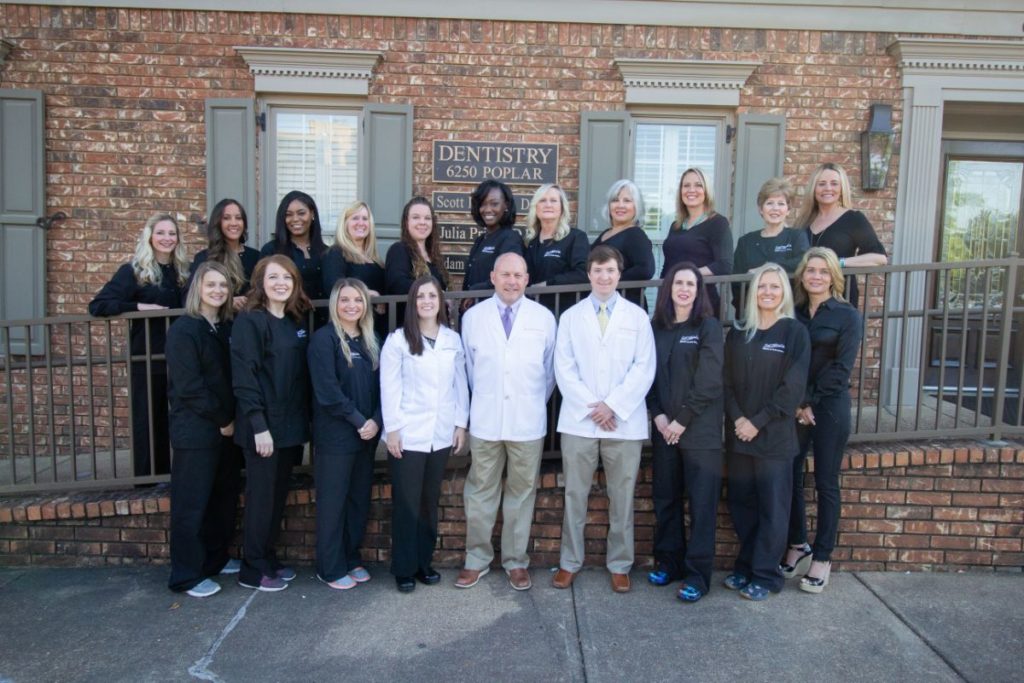Here at Scott Edwards Cosmetic and Family Dentistry, we’re proud to provide comprehensive dental care for Mid-South patients of all ages. We’ve been restoring and enhancing smiles for almost thirty years using the latest technology and techniques. That includes highly effective treatments like dental implants and partial dentures. If you’re missing one or more teeth, these can improve the appearance and function of your mouth, transforming your smile and boosting your confidence! Dentist in Memphis, Cosmetic Dentistry Memphis, and Memphis Dental offer insights into dental implants vs. partial dentures, what’s best for you? To learn more about the unique benefits of each and how they can improve your dental health, keep reading below.
What you need to know: dental implants
We use dental implants to replace a single missing tooth, multiple missing teeth, a floppy denture, or an entire upper or lower arch. After assessing your mouth and confirming you’re a good fit for dental implants, we will refer you to a trusted oral surgeon for placement. The implants are small rods that have been crafted from medical-grade titanium alloy, a material that is naturally accepted by the body. They are placed directly into the empty socket of the absent tooth or teeth.
As this area heals, the jawbone and gum tissue will fuse with the implant. This forms an artificial root. When your mouth is fully healed, you’ll return for the final stage of the process, a stage known as implant restoration. Dr. Edwards or Dr. Prince will attach a realistic-looking dental crown or a sturdy fixed bridge to complete your smile transformation, depending on your specific needs. Your custom implants will give you a fully functional smile that looks and feels completely natural!

What you need to know: partial dentures
There are two main types of dentures: full and partial. If all the teeth are missing, full dentures can be used. If only some teeth are missing, partial dentures are the better choice. These work in essentially the same way as full dentures, but they are anchored onto the remaining teeth with clasps and customized to fit your natural smile.
Denture teeth are generally made from porcelain or acrylic resin. Porcelain dentures more closely resemble natural enamel, so it’s easy to match them to any remaining teeth. However, they do tend to be more prone to breakage and can wear down any remaining teeth. For this reason, they tend to work better as a full denture rather than a partial denture.
Dentures that are crafted from acrylic resin are very light and can adhere more securely to a denture base. They also make it easier to adjust to the position of the teeth when the jaw is closed and can be less expensive than porcelain. They do wear down faster than porcelain, though, and will usually need to be replaced every 5-8 years or so. They may also change the way the teeth make contact with each other.
Dental implants or partial dentures: what’s best for your smile?
When comparing dental implants and partial dentures, there are several factors you should take into consideration, including the comfort of the appliance, as well as its appearance, cost, and reliability.
Dental implants can be an excellent solution if your primary concern is comfort and reliability. They’re permanently fixed in place, stronger than dentures, and able to withstand years of use without damage or decay. That means you’ll never need to worry about them shifting, slipping, or falling out! A partial denture also relies on nearby teeth to keep it in place, but it can sometimes cause damage to those same teeth. That’s because it depends on them to achieve stability, as clasping onto them is how they sit in the mouth. If the teeth decay, fall out, or need to be removed, the partial denture will no longer work as designed.
Partial dentures can last up to 8 years with proper maintenance, which is pretty impressive! On the other hand, dental implants can last a lifetime if you take good care of them. The materials they’re made of won’t decay, and they’re immune to much of the harmful bacteria that can cause cavities. It’s important to note that any crowns you have with partial dentures can be damaged or chipped, just like a natural tooth.
While partial dentures do tend to be a more affordable treatment option than dental implants, they don’t solve the problem of long-term jawbone deterioration. Once your body becomes aware of a missing tooth, it will begin absorbing minerals in your jaw to use elsewhere. The area of the jaw where the tooth root used to be will then weaken and deteriorate, tilting the adjacent teeth toward the open space. Over time, this can alter the shape of the face and jaw, making it difficult to continue wearing dentures.

Transform your smile with Scott Edwards Cosmetic and Family Dentistry
Dentures have come along in leaps and bounds in recent years, and the fit we can achieve now is better than ever before! Partial dentures are beneficial in many ways. They can improve the appearance of your smile, better support the facial muscles, and reduce signs of aging. These dentures will even allow you to eat and speak with greater confidence and comfort!
Dental implants are the closest you can get to how your natural teeth look, feel, and function. Although dentures, partials, and bridges can sometimes contribute to the bone and tissue degrading over time, implants help the bone and gum tissue remain healthy and strong. They also have impressive longevity! When properly cared for, they can last you a lifetime.
If you have missing teeth, we’ve got an effective solution to help restore and transform your smile! Get in touch today to schedule a consultation and find out more.
